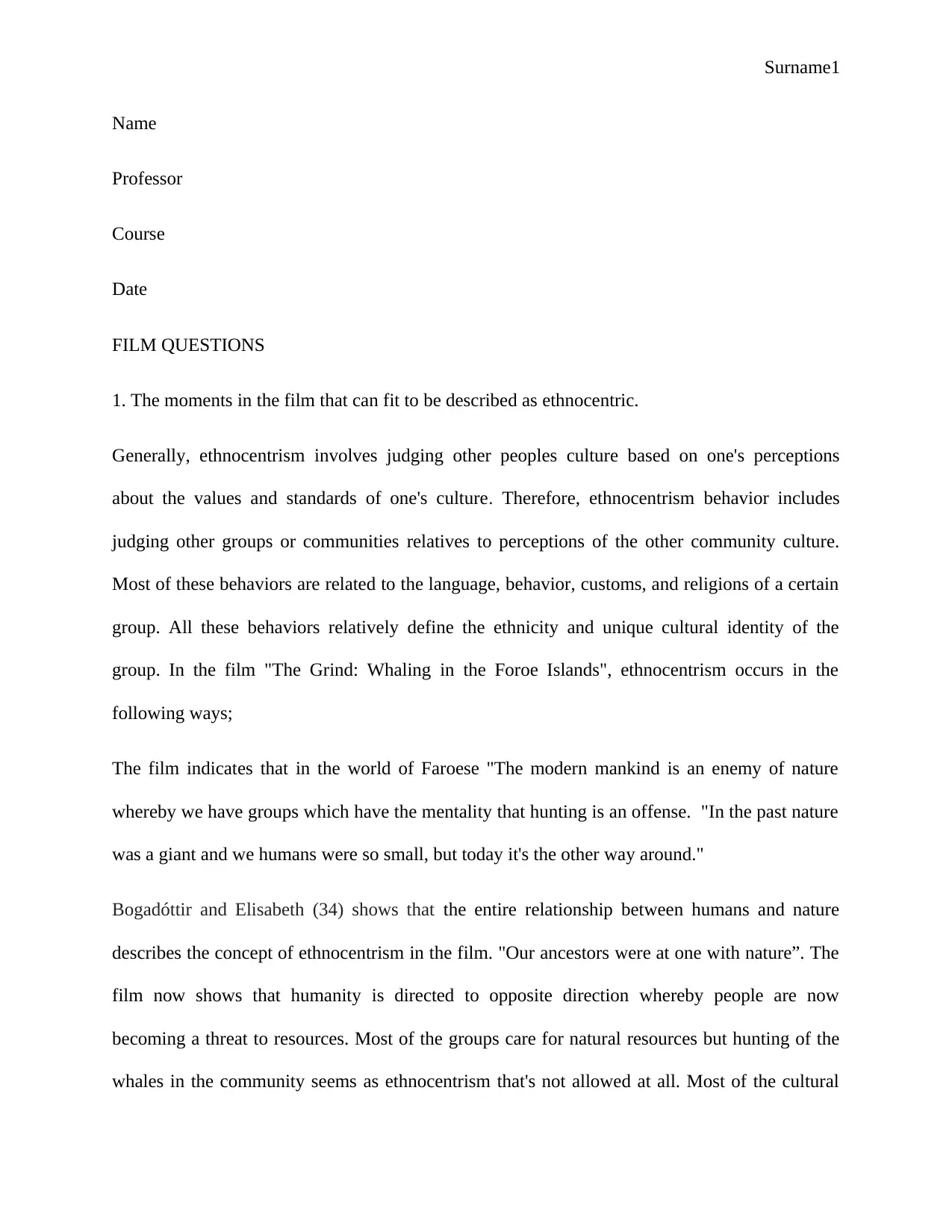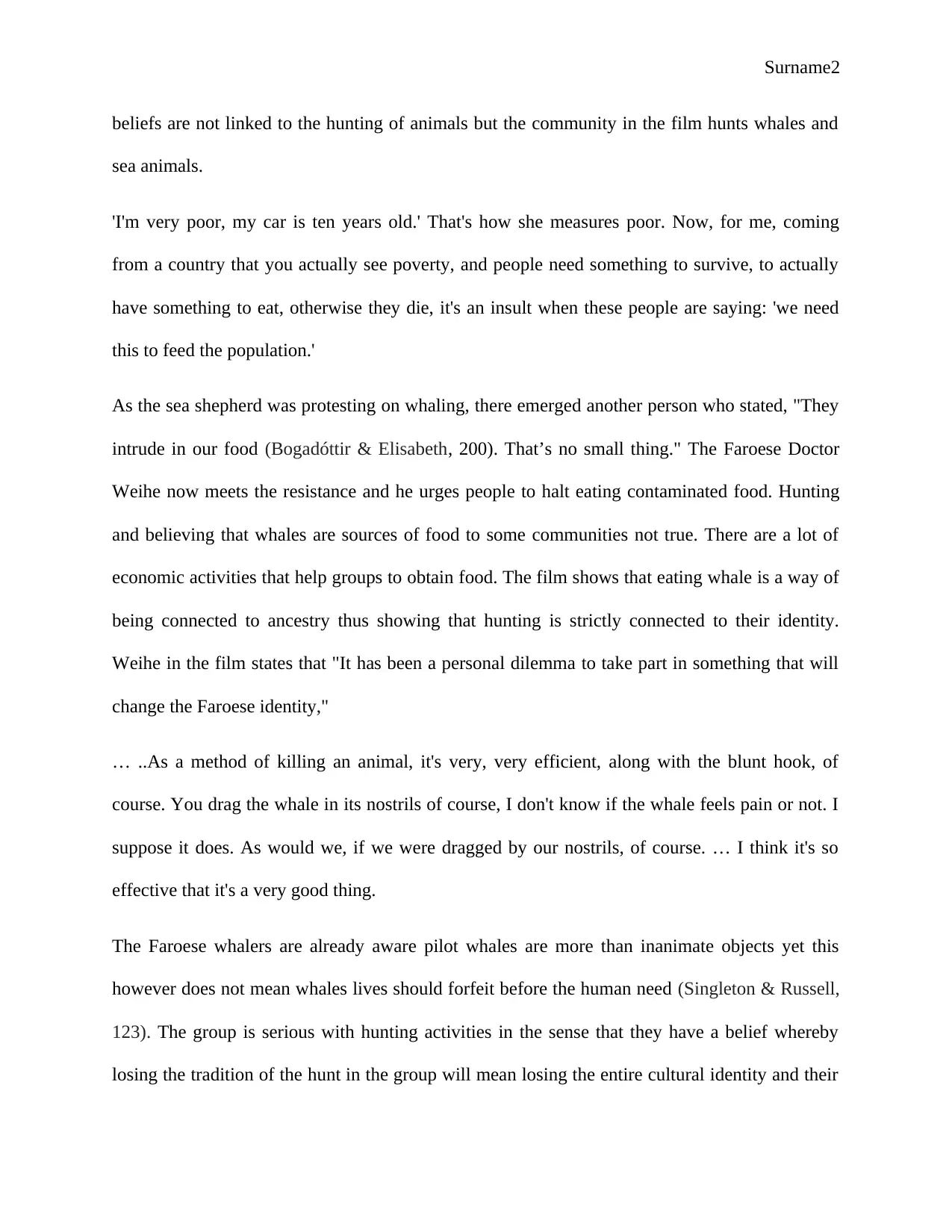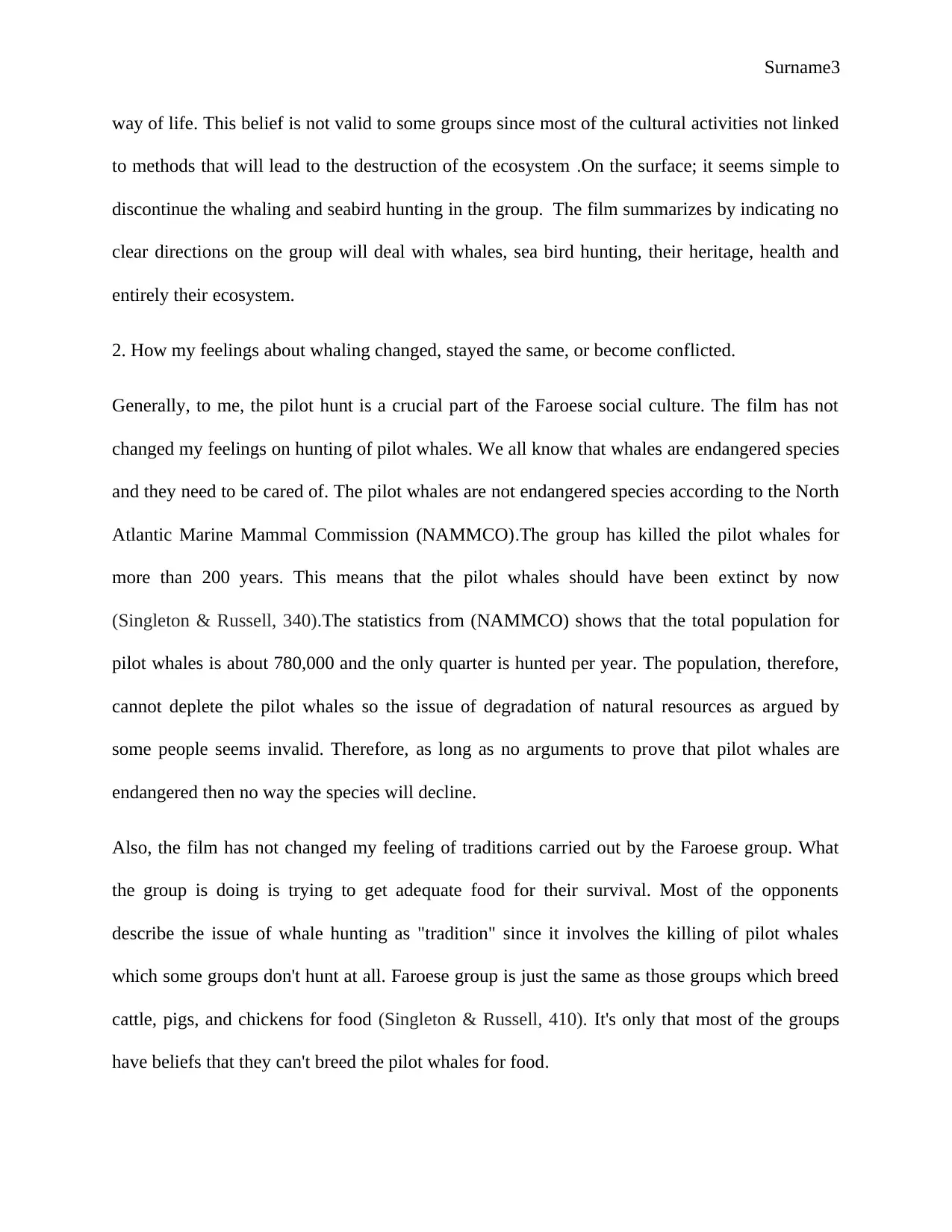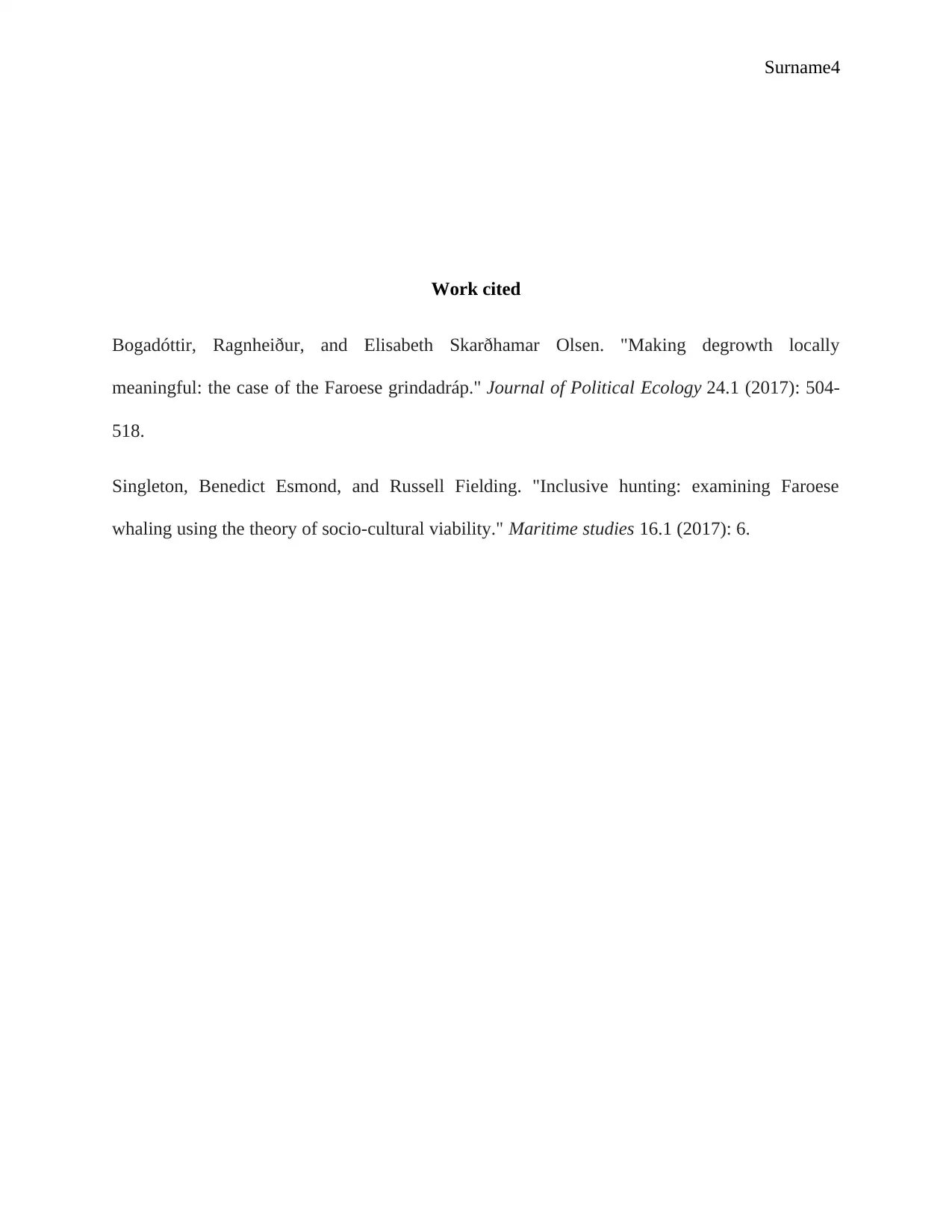Ethnocentrism & Cultural Identity: A Film Analysis of Faroe Whaling
VerifiedAdded on 2023/04/07
|4
|935
|332
Essay
AI Summary
This essay explores ethnocentrism as depicted in the film 'The Grind: Whaling in the Faroe Islands,' focusing on how cultural values influence perceptions of whaling practices. It examines moments in the film where Faroese culture clashes with external viewpoints, particularly regarding hunting traditions and resource management. The author reflects on how the film has shaped their understanding of whaling, considering arguments related to cultural identity, sustainability, and animal rights. Ultimately, the essay delves into the complexities of balancing cultural preservation with ethical considerations and ecological concerns, highlighting the lack of easy solutions in navigating these issues. Desklib provides access to similar essays and study resources for students.

Surname1
Name
Professor
Course
Date
FILM QUESTIONS
1. The moments in the film that can fit to be described as ethnocentric.
Generally, ethnocentrism involves judging other peoples culture based on one's perceptions
about the values and standards of one's culture. Therefore, ethnocentrism behavior includes
judging other groups or communities relatives to perceptions of the other community culture.
Most of these behaviors are related to the language, behavior, customs, and religions of a certain
group. All these behaviors relatively define the ethnicity and unique cultural identity of the
group. In the film "The Grind: Whaling in the Foroe Islands", ethnocentrism occurs in the
following ways;
The film indicates that in the world of Faroese "The modern mankind is an enemy of nature
whereby we have groups which have the mentality that hunting is an offense. "In the past nature
was a giant and we humans were so small, but today it's the other way around."
Bogadóttir and Elisabeth (34) shows that the entire relationship between humans and nature
describes the concept of ethnocentrism in the film. "Our ancestors were at one with nature”. The
film now shows that humanity is directed to opposite direction whereby people are now
becoming a threat to resources. Most of the groups care for natural resources but hunting of the
whales in the community seems as ethnocentrism that's not allowed at all. Most of the cultural
Name
Professor
Course
Date
FILM QUESTIONS
1. The moments in the film that can fit to be described as ethnocentric.
Generally, ethnocentrism involves judging other peoples culture based on one's perceptions
about the values and standards of one's culture. Therefore, ethnocentrism behavior includes
judging other groups or communities relatives to perceptions of the other community culture.
Most of these behaviors are related to the language, behavior, customs, and religions of a certain
group. All these behaviors relatively define the ethnicity and unique cultural identity of the
group. In the film "The Grind: Whaling in the Foroe Islands", ethnocentrism occurs in the
following ways;
The film indicates that in the world of Faroese "The modern mankind is an enemy of nature
whereby we have groups which have the mentality that hunting is an offense. "In the past nature
was a giant and we humans were so small, but today it's the other way around."
Bogadóttir and Elisabeth (34) shows that the entire relationship between humans and nature
describes the concept of ethnocentrism in the film. "Our ancestors were at one with nature”. The
film now shows that humanity is directed to opposite direction whereby people are now
becoming a threat to resources. Most of the groups care for natural resources but hunting of the
whales in the community seems as ethnocentrism that's not allowed at all. Most of the cultural
Paraphrase This Document
Need a fresh take? Get an instant paraphrase of this document with our AI Paraphraser

Surname2
beliefs are not linked to the hunting of animals but the community in the film hunts whales and
sea animals.
'I'm very poor, my car is ten years old.' That's how she measures poor. Now, for me, coming
from a country that you actually see poverty, and people need something to survive, to actually
have something to eat, otherwise they die, it's an insult when these people are saying: 'we need
this to feed the population.'
As the sea shepherd was protesting on whaling, there emerged another person who stated, "They
intrude in our food (Bogadóttir & Elisabeth, 200). That’s no small thing." The Faroese Doctor
Weihe now meets the resistance and he urges people to halt eating contaminated food. Hunting
and believing that whales are sources of food to some communities not true. There are a lot of
economic activities that help groups to obtain food. The film shows that eating whale is a way of
being connected to ancestry thus showing that hunting is strictly connected to their identity.
Weihe in the film states that "It has been a personal dilemma to take part in something that will
change the Faroese identity,"
… ..As a method of killing an animal, it's very, very efficient, along with the blunt hook, of
course. You drag the whale in its nostrils of course, I don't know if the whale feels pain or not. I
suppose it does. As would we, if we were dragged by our nostrils, of course. … I think it's so
effective that it's a very good thing.
The Faroese whalers are already aware pilot whales are more than inanimate objects yet this
however does not mean whales lives should forfeit before the human need (Singleton & Russell,
123). The group is serious with hunting activities in the sense that they have a belief whereby
losing the tradition of the hunt in the group will mean losing the entire cultural identity and their
beliefs are not linked to the hunting of animals but the community in the film hunts whales and
sea animals.
'I'm very poor, my car is ten years old.' That's how she measures poor. Now, for me, coming
from a country that you actually see poverty, and people need something to survive, to actually
have something to eat, otherwise they die, it's an insult when these people are saying: 'we need
this to feed the population.'
As the sea shepherd was protesting on whaling, there emerged another person who stated, "They
intrude in our food (Bogadóttir & Elisabeth, 200). That’s no small thing." The Faroese Doctor
Weihe now meets the resistance and he urges people to halt eating contaminated food. Hunting
and believing that whales are sources of food to some communities not true. There are a lot of
economic activities that help groups to obtain food. The film shows that eating whale is a way of
being connected to ancestry thus showing that hunting is strictly connected to their identity.
Weihe in the film states that "It has been a personal dilemma to take part in something that will
change the Faroese identity,"
… ..As a method of killing an animal, it's very, very efficient, along with the blunt hook, of
course. You drag the whale in its nostrils of course, I don't know if the whale feels pain or not. I
suppose it does. As would we, if we were dragged by our nostrils, of course. … I think it's so
effective that it's a very good thing.
The Faroese whalers are already aware pilot whales are more than inanimate objects yet this
however does not mean whales lives should forfeit before the human need (Singleton & Russell,
123). The group is serious with hunting activities in the sense that they have a belief whereby
losing the tradition of the hunt in the group will mean losing the entire cultural identity and their

Surname3
way of life. This belief is not valid to some groups since most of the cultural activities not linked
to methods that will lead to the destruction of the ecosystem .On the surface; it seems simple to
discontinue the whaling and seabird hunting in the group. The film summarizes by indicating no
clear directions on the group will deal with whales, sea bird hunting, their heritage, health and
entirely their ecosystem.
2. How my feelings about whaling changed, stayed the same, or become conflicted.
Generally, to me, the pilot hunt is a crucial part of the Faroese social culture. The film has not
changed my feelings on hunting of pilot whales. We all know that whales are endangered species
and they need to be cared of. The pilot whales are not endangered species according to the North
Atlantic Marine Mammal Commission (NAMMCO).The group has killed the pilot whales for
more than 200 years. This means that the pilot whales should have been extinct by now
(Singleton & Russell, 340).The statistics from (NAMMCO) shows that the total population for
pilot whales is about 780,000 and the only quarter is hunted per year. The population, therefore,
cannot deplete the pilot whales so the issue of degradation of natural resources as argued by
some people seems invalid. Therefore, as long as no arguments to prove that pilot whales are
endangered then no way the species will decline.
Also, the film has not changed my feeling of traditions carried out by the Faroese group. What
the group is doing is trying to get adequate food for their survival. Most of the opponents
describe the issue of whale hunting as "tradition" since it involves the killing of pilot whales
which some groups don't hunt at all. Faroese group is just the same as those groups which breed
cattle, pigs, and chickens for food (Singleton & Russell, 410). It's only that most of the groups
have beliefs that they can't breed the pilot whales for food.
way of life. This belief is not valid to some groups since most of the cultural activities not linked
to methods that will lead to the destruction of the ecosystem .On the surface; it seems simple to
discontinue the whaling and seabird hunting in the group. The film summarizes by indicating no
clear directions on the group will deal with whales, sea bird hunting, their heritage, health and
entirely their ecosystem.
2. How my feelings about whaling changed, stayed the same, or become conflicted.
Generally, to me, the pilot hunt is a crucial part of the Faroese social culture. The film has not
changed my feelings on hunting of pilot whales. We all know that whales are endangered species
and they need to be cared of. The pilot whales are not endangered species according to the North
Atlantic Marine Mammal Commission (NAMMCO).The group has killed the pilot whales for
more than 200 years. This means that the pilot whales should have been extinct by now
(Singleton & Russell, 340).The statistics from (NAMMCO) shows that the total population for
pilot whales is about 780,000 and the only quarter is hunted per year. The population, therefore,
cannot deplete the pilot whales so the issue of degradation of natural resources as argued by
some people seems invalid. Therefore, as long as no arguments to prove that pilot whales are
endangered then no way the species will decline.
Also, the film has not changed my feeling of traditions carried out by the Faroese group. What
the group is doing is trying to get adequate food for their survival. Most of the opponents
describe the issue of whale hunting as "tradition" since it involves the killing of pilot whales
which some groups don't hunt at all. Faroese group is just the same as those groups which breed
cattle, pigs, and chickens for food (Singleton & Russell, 410). It's only that most of the groups
have beliefs that they can't breed the pilot whales for food.
⊘ This is a preview!⊘
Do you want full access?
Subscribe today to unlock all pages.

Trusted by 1+ million students worldwide

Surname4
Work cited
Bogadóttir, Ragnheiður, and Elisabeth Skarðhamar Olsen. "Making degrowth locally
meaningful: the case of the Faroese grindadráp." Journal of Political Ecology 24.1 (2017): 504-
518.
Singleton, Benedict Esmond, and Russell Fielding. "Inclusive hunting: examining Faroese
whaling using the theory of socio-cultural viability." Maritime studies 16.1 (2017): 6.
Work cited
Bogadóttir, Ragnheiður, and Elisabeth Skarðhamar Olsen. "Making degrowth locally
meaningful: the case of the Faroese grindadráp." Journal of Political Ecology 24.1 (2017): 504-
518.
Singleton, Benedict Esmond, and Russell Fielding. "Inclusive hunting: examining Faroese
whaling using the theory of socio-cultural viability." Maritime studies 16.1 (2017): 6.
1 out of 4
Your All-in-One AI-Powered Toolkit for Academic Success.
+13062052269
info@desklib.com
Available 24*7 on WhatsApp / Email
![[object Object]](/_next/static/media/star-bottom.7253800d.svg)
Unlock your academic potential
Copyright © 2020–2026 A2Z Services. All Rights Reserved. Developed and managed by ZUCOL.